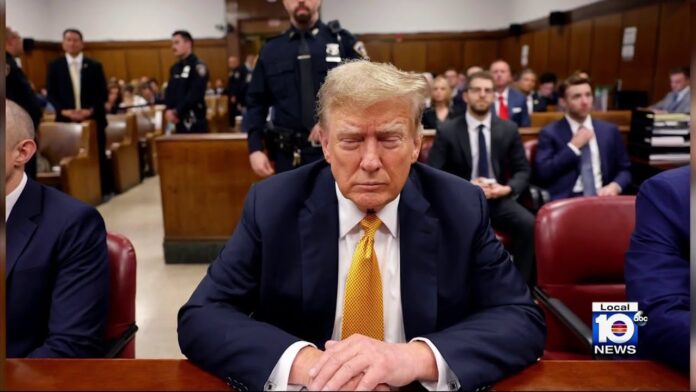Former President Trump concludes defence in hush money case, jury deliberations to start after Memorial Day weekend
Former U.S. President Donald Trump decided not to testify in his criminal hush money trial on Tuesday. This decision brought his defence to a swift end, paving the way for jurors to begin deliberations next week. For weeks, Trump had fueled speculation about whether he would take the stand to defend himself against charges of falsifying business records. These charges stem from allegations of a hush-money payment to porn star Stormy Daniels before the 2016 presidential election.
Trump’s potential testimony could have served to convince the jury that his primary motive was to shield his family from embarrassment. Instead, it could have further complicated his defence. Criminal defendants typically avoid testifying in their trials to escape rigorous cross-examination by prosecutors. Additionally, Trump would have faced the risk of perjury if he lied under oath.
In a previous civil fraud trial, Trump’s defiant testimony led to judicial reprimands and a $355 million penalty. Such a performance in the current case could have negatively impacted the jury’s perception. Retired New York judge George Grasso remarked, “He could tank his whole case with one outburst.”
Trump, now 77, pleaded not guilty to 34 charges of falsifying business records. He has consistently denied any wrongdoing, including any sexual relationship with Daniels. Prosecutors assert that the altered records were intended to conceal election-law and tax-law violations. They argue that the hush money was essentially an unreported contribution to Trump’s campaign, elevating the misdemeanours to felonies punishable by up to four years in prison.
Outside the courtroom, Trump has repeatedly criticized the judge as corrupt and accused prosecutors of undermining his bid to return to the White House in the upcoming November election. Despite these claims, his legal team called only two witnesses to testify on his behalf.
Judge Juan Merchan announced that the jurors would reconvene next Tuesday after the Memorial Day weekend for closing arguments. Jury deliberations are expected to commence the following day. Trump’s defence team had requested the dismissal of the case, arguing that it relied heavily on testimony from Michael Cohen, Trump’s former fixer, whose credibility they questioned due to his history of lying. However, Judge Merchan indicated a preference for allowing the jury to assess Cohen’s credibility.
Cohen’s testimony played a central role in the prosecution’s case. He stated that he frequently discussed the payment to Daniels with Trump during the final phase of the 2016 presidential campaign. At that time, Trump faced numerous accusations of sexual misconduct. Cohen claimed that Trump was concerned about Daniels’ story damaging his appeal to female voters if it became public.
In response, Trump’s legal team argued that the prosecution’s case lacked a solid foundation and depended too much on Cohen’s dubious testimony. Despite these arguments, prosecutors maintained that Cohen’s statements were corroborated by other evidence.
As the trial nears its conclusion, Trump’s decision not to testify remains a strategic choice, reflecting the high risks involved in personal testimony. The jury’s deliberation next week will determine the outcome of this high-profile case, which has significant implications for Trump’s political future.
Analysis :
Trump’s decision to refrain from testifying in his criminal trial highlights the high stakes involved. His legal team likely advised against testifying due to the potential for damaging cross-examination and the risk of perjury. Given Trump’s history of inflammatory statements, his presence on the stand could have jeopardized his defence.
From a political perspective, Trump’s legal troubles occur amid his campaign to reclaim the presidency. His claims that the trial is a politically motivated attack may resonate with his base, framing the legal battle as another instance of political persecution. This narrative could bolster his support among loyal followers who view him as a victim of a biased legal system.
Sociologically, the trial underscores the enduring impact of allegations of sexual misconduct on public figures. The hush money payment to Daniels aimed to suppress damaging information that could affect voter perception, particularly among women. This reflects broader societal issues regarding the treatment of women and the use of power to silence accusers.
Economically, the case has implications for campaign finance laws. The prosecution’s argument that the hush money constituted an unreported campaign contribution highlights the intricate relationship between money and politics. The trial’s outcome could influence future enforcement of campaign finance regulations.
Locally, the trial has significant ramifications for New York’s judicial system. The case draws national attention to the state’s ability to handle high-profile trials involving influential figures. Judge Merchan’s decisions throughout the trial will be scrutinized, potentially impacting public trust in the judiciary.
Gender dynamics also play a crucial role in this case. Daniels’ testimony about her encounter with Trump brings to light issues of consent and power. Her decision to come forward, despite the potential for public backlash, reflects the ongoing struggle for women’s voices to be heard and believed.
In summary, Trump’s decision not to testify is a calculated legal strategy aimed at avoiding additional risks. The trial’s outcome will not only affect Trump’s political aspirations but also set precedents in campaign finance law and the treatment of sexual misconduct allegations.
